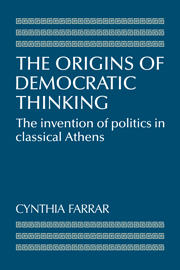Book contents
- Frontmatter
- Contents
- Dedication
- Preface
- 1 Ancient reflections: a force for us
- 2 Order in autonomy: the ungoverned cosmos and the democratic community
- 3 Protagoras: measuring man
- 4 Man's measurings: cosmos and community
- 5 Thucydides: reflecting history – man and the community
- 6 Democritus: reflecting man – the individual and the cosmos
- 7 Living democracy?
- Bibliography
- Indexes
4 - Man's measurings: cosmos and community
Published online by Cambridge University Press: 23 October 2009
- Frontmatter
- Contents
- Dedication
- Preface
- 1 Ancient reflections: a force for us
- 2 Order in autonomy: the ungoverned cosmos and the democratic community
- 3 Protagoras: measuring man
- 4 Man's measurings: cosmos and community
- 5 Thucydides: reflecting history – man and the community
- 6 Democritus: reflecting man – the individual and the cosmos
- 7 Living democracy?
- Bibliography
- Indexes
Summary
According to Protagoras, the form of life inhabited by man qua man is political, and so are human needs; criticism and enlightenment proceed within a shared and bounded consciousness. In politics conceived as the arena for the pursuit of the good life for man and the vehicle for increased self-knowledge and knowledge of the good, men are made aware, through their participation in the polis, of the human interests which both constitute and are constituted by it. In the process of co-operating to achieve the goods specified by the polis, men enhance their own capacities and understanding; part of what they come to understand is how the polis is bound up with their own interests. A human practice, like the polis, that encompasses and expresses the good life for man can safely enlighten men about the character of that life so long as the practice does encompass what man takes to be his own good. External criticism, founded on conceptions of one's own good which are not defined by the practice, is both cause and consequence of disintegration. In the years after Protagoras offered his analysis of the polis and its relation to human needs and human awareness, and in part because of this analysis and the developments it reflected, the Athenians came to regard the political practice itself as external, no longer as expressive and constitutive of man's good and his freedom.
- Type
- Chapter
- Information
- The Origins of Democratic ThinkingThe Invention of Politics in Classical Athens, pp. 99 - 125Publisher: Cambridge University PressPrint publication year: 1988

